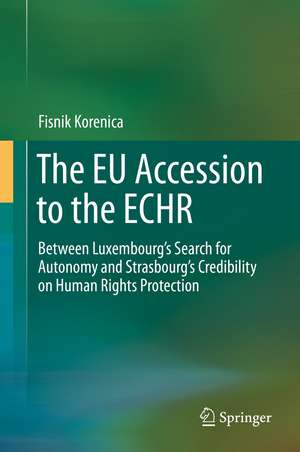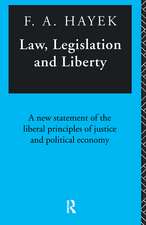The EU Accession to the ECHR: Between Luxembourg’s Search for Autonomy and Strasbourg’s Credibility on Human Rights Protection
Autor Fisnik Korenicaen Limba Engleză Hardback – 3 sep 2015
| Toate formatele și edițiile | Preț | Express |
|---|---|---|
| Paperback (1) | 649.87 lei 6-8 săpt. | |
| Springer International Publishing – 22 oct 2016 | 649.87 lei 6-8 săpt. | |
| Hardback (1) | 656.43 lei 6-8 săpt. | |
| Springer International Publishing – 3 sep 2015 | 656.43 lei 6-8 săpt. |
Preț: 656.43 lei
Preț vechi: 772.26 lei
-15% Nou
Puncte Express: 985
Preț estimativ în valută:
125.61€ • 136.87$ • 105.84£
125.61€ • 136.87$ • 105.84£
Carte tipărită la comandă
Livrare economică 23 aprilie-07 mai
Preluare comenzi: 021 569.72.76
Specificații
ISBN-13: 9783319217581
ISBN-10: 3319217585
Pagini: 400
Ilustrații: XIX, 471 p. 6 illus., 5 illus. in color.
Dimensiuni: 155 x 235 x 27 mm
Greutate: 0.86 kg
Ediția:1st ed. 2015
Editura: Springer International Publishing
Colecția Springer
Locul publicării:Cham, Switzerland
ISBN-10: 3319217585
Pagini: 400
Ilustrații: XIX, 471 p. 6 illus., 5 illus. in color.
Dimensiuni: 155 x 235 x 27 mm
Greutate: 0.86 kg
Ediția:1st ed. 2015
Editura: Springer International Publishing
Colecția Springer
Locul publicării:Cham, Switzerland
Public țintă
ResearchCuprins
Part I: The EU as a Sui Generis Human Rights Law Organization: Situating the Roots of the Accession Question: 1. Introduction to the Book.- 2. EU Becoming a Human Rights Law Organization: Starting from Nowhere with a ‘Gouvernment des Juges’.- 3. EU Law Autonomy: Where Does the Viewpoint for ‘Competition’ of Luxembourg Start from?.- Part II: The Draft Accession Agreement of the EU Accession to the ECHR: an Examination of the Central Mechanisms in Light of EU Law Peculiarities.- 4. A New Start for the Accession of the EU to the ECHR.- 5. Status of ECHR and DAA in EU Legal Order.- 6. Attribution of Liability Under the Co-respondent Mechanism.- 7. Inter-Party Mechanism and the EU: Possible Implications from the Strasbourg’s Jurisdiction?.- 8. EU Prior Involvement Review.- Part III: A Strasbourg Perspective on Applications of EU Law Origin.- 9. Testing the Co-respondent Mechanism from the Strasbourg Court Perspective: Three Distinctive Cases with Three Distinctive Scenarios.- 10. Admissibility Before the Strasbourg Court: An Outlook on the EU Law Originated Applications.- Part IV: Approaching the Final ‘Station’.- 11. Before the Conclusion: Luxembourg Court’s Opinion 2/13 on the DAA’s Compatibility with the EU Treaties.- 12. An Overall Conclusion.
Textul de pe ultima copertă
This book examines the EU accession to the ECHR from a systemic perspective as well as from the specific perspective of the 2013 draft accession agreement negotiated between the relevant body of the Council of Europe and the EU Commission. It mainly follows a legal positivist approach to examining the nature and scope of obligations that will regulate the new relationship between EU law and European Convention on Human Rights law, concentrating specifically on the issue of jurisdictional interface between the Strasbourg and Luxembourg courts. The book offers an in-depth examination of the core mechanisms of the draft accession agreement, taking into account the remarks in Luxembourg's Opinion 2/13, focusing especially on the issue of attribution of responsibility when a violation of ECHR has been jointly committed by the EU and its Member States, the inter-party procedure and the prior involvement mechanism. The work basically argues that EU accession to the ECHR will have a constitutional impact on the EU legal order, and may also have certain implications for the jurisdictional interface between the Strasbourg and Luxembourg courts. It also questions the mode of interaction between some normative aspects of ECHR law and EU law, offering certain arguments as to the interaction between the Charter of Fundamental Rights and ECHR from overlapping and accommodative perspectives post-accession. The book concludes that with the EU accession to the ECHR – as it stands right now with the draft accession agreement – the macro relationship between the Strasbourg and Luxembourg courts will change significantly, while their constitutional roles will become vertically accommodated and better specialized.
Caracteristici
A unique contribution in this novel field of law Offers an extraordinary perspective on the developing legal pluralism in Europe Includes a reader-friendly introduction and theoretical background on how the relationship between these two regimes of law has gradually developed on the European continent Presents an in-depth examination of the draft accession agreement from comparative perspectives of global law and international jurisdictions Includes supplementary material: sn.pub/extras


















